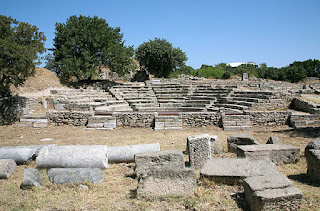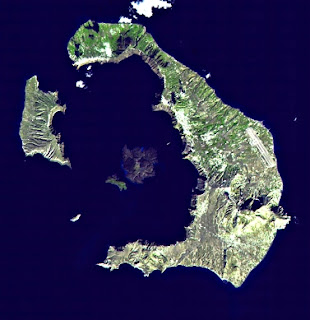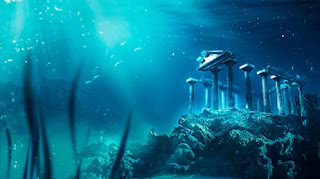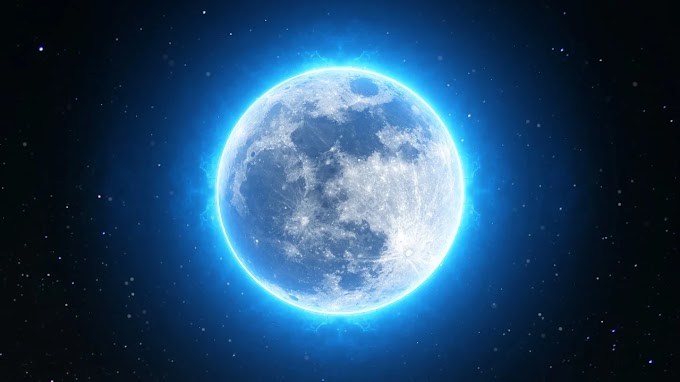The lost City
of
Atlantis
Questions continue to fascinate researchers and explorers to this day
was Atlantis a real place or merely a literary device warning against pride and hubris. How could a civilization were the strength to maintain a maritime empire and to threaten Greece's security have simply disappeared. Why is there no mention of Atlantis in any ancient texts other than Plato's. Where was this island capital located and what could possibly obliterate this famed nation as Plato asserted within a night and a day.
These questions have taken geological researchers all around the world from Morocco to Indonesia from Bolivia to the North Sea from the Mediterranean to the Sahara all in search of Atlantis still the majority of commentators regard Plato's description as nothing more than literary fiction a salutary tale against national pride, and military hubris.
Plato certainly uses fiction in his writings nobody takes his dialogues as a verbatim recollection of an actual conversation but Plato was real and his subject Socrates was real. Plato's skill and passion in getting across saketis teaching is real, and in his dialogues Plato certainly appeals to events in real-world history now when we come to his long description of Atlantis intimates and Critias to me it just doesn't bear the marks of pure fiction Plato's references to higher beings or gods and to beings who hybrids of gods and humans are taken by some to be evidence that his Atlantean narratives are pure fiction, yet we find similar references in the texts of other ancient cultures who pepper their ancient histories with mention of similar entities. Many people think of plato's description of Atlantis as if he's describing some kind of a utopia but that's really not the case Atlantis has an army it goes to war it was he said an enemy of prehistoric Athens but that Athens defeated it so it's not a utopia and Plato's descriptions of it are so full of details that have nothing to do with advancing a story of national hubris or pride comes before a fall which is often how people interpret Atlantis when they want to say it is a fiction now Plato said that this information had been obtained from ancient Egyptian priests who had relayed the information to an ancient Greek legislature called Solon and once again that is a real person in real history for me those are all details that point to Atlantis being a real culture in real world history.
What really sparked the modern quest for Plato's Atlantis was the discovery in 1868 of the ancient and mythical city of Troy for centuries the academic consensus was the Troy was the literary creation of Homer a Greek author who predated Plato by at least 500 years. In his work the Iliad Homer details the Trojan War and the ten-year siege on the city of Troy. Most scholars read these works as pure fiction yet a few commentators quietly wondered if the fiction might be threaded through with real history of real places and real world events. Plato's references to higher beings or gods and to beings who are hybrids of gods and humans are taken my son to be evidence that his narratives are pure fiction yet similar references can be found in the texts of other historic cultures who pepper their ancient histories with mention of similar entities the wide consensus that Troy was no more than fiction was dealta fatal blow when in 1868. A 46 year old German archaeologist Heinrich Schliemann discovered the mythical city of Troy.
The way Heinrich Schliemann said about locating Troy was simply to make a checklist from all the Geographic markers that Homer had placed in his narratives and used them as a guide to get him to the location that's the discovery that's given energy to today's explorers to do the same with Atlantis in Plato's writing identify all the geographic and geological markers in Plato's texts and then follow the clues and we'll meet an Atlantis.
One of the most distinctive geological markers of Atlantis was the structure of the port city looking across Atlantis from a height one would see a central island surrounded by concentric circles of land separated by seawater. The circles of land were connected by a bridge and the outer moat allowed a passage south to the Atlantic geologists have identified this as the natural shape of an island formed by an undersea volcanic eruption solidified and then modified by erosion. The remains of one such structure can be found in the Aegean Sea at the Greek island of Santorinihome to the ancient Minoan culture in 1913 and 1917 Katie Frost and Es bulk proposed that the story of Atlantis and its catastrophic demise might relate to the ancient history of the Minoan civilization on Santorini.
Archaeological searches in the region have demonstrated that the ancient Minoan culture was advanced in civil engineering with plumbing airflow management multi-story buildings an earthquake resistant design. Santorini may well have been home to a maritime Empire with the force to fit itself against ancient mainland Greece. Which according to Plato was exactly what Atlantis did historically Santorini was indeed wiped out by a single major Cataclysm a volcanic eruption in the second millennium BCE could santorini have been the inspiration behind Plato's Atlantis. Santorini was a developed maritime power the remaining built structures of the city of Akrotiri on Santorini reveal a degree of sophistication that may well have rival the Civic environment of preancient Athens, however it is difficult to correlate the geological clues that Plato claimed for Atlantis the concentric circles of the Atlantean capital cannot be identified. Crete rather than Santorini was the local center of power. Santorini did not sink under the waves of the Atlantic it was buried in the Aegean Sea by a volcanic eruption further more Santorini's timeline does not match the dates that Plato claimed for Atlantis neither is it opposite the location almost universally accepted for The Pillars of Hercules.
One of the key Geographic markers that Plato gave was that he placed Atlantis which would the capital city and associated islands he said was a landmass a little larger than modern day Libya, and he placed it beyond and opposite The Pillars of Hercules across from The Pillars of Hercules he said or Heracles as the ancient Greeks would say. Now those pillars were understood by the ancient Greeks to refer to the two towering promontories that flanked the entrance to the Strait of Gibraltar and Greek legend tells the story of Heracles marking the edge the western edge of the known world and beyond that was the unknown world and that would place Atlantis not in Santorini but somewhere to the west in the North Atlantic to the west of Spain and northwest Africa.
But how far west evidences of ancient cities lost in the terrain and under the coastal waters of South America have led some to locate Atlantis in modern-day Amazonia Bolivia or off the coast of Cuba but for an ancient maritime people to advance a naval attack on Athens from Cuba or Bolivia would not appear in the least feasible.
Cuba is one of a number of locations on planet earth whose coastal waters have submerged the cities of a previous culture the island of Malta famously has these deep tracks embedded in stone that lead something onto land that is now thousands of feet underwater off the coast of Yonaguni Jima in Japan and in the Gulf of Cambay off the coast of India under 25 to 36 meters of water scientists have discovered the remains of streets capes and city scapes that would have been above sea level no more recently than 10,000 years ago so there's no shortage of evidence for a civilization long predating our own so while these places are fascinating and certainly important because it tells us there's a huge gap in our knowledge of our ancestry in our ancient past they're not Plato's Atlantis they're just in the wrong place.
Plato's Geographic clues have led some explorers to the coastal regions of Spain and northwest Africa but what did the Northwest African coastline look like 11 and a half millennia ago at the time of Atlantis. What tectonic shifts might have altered the lie of the land and the perimeter of the oceans plato's description of an earthquake and a tsunami certainly hinted a cataclysm of global proportions viewed from space the western coast of Mauritania bears the unmistakable scars of an immense deluge a wash of sand and silt has immersed a huge section of land spanning from the North Atlantic to the interior of what is now the Sahara Desert land that is now well above sea level was once underwater. Accordingly the desert floor is scattered with the remains of marine animals their skeletons and shells a testament to the lands oceanic past here in 2008 nataly's Rosen and George S Alexander began to investigate and anomaly in the Mauritania landscape a structure within the eye of Africa the rehab structure concentric rims of land alternating with deep troughs correspond with the unusual shape of Atlantis with the land lower or the sea level higher the correlations with Atlantis become clearer other clues in Plato's text find correlations here the white red and black stone Springs of salt water and one of fresh water the preponderance of elephant remains mountains rivers and a plateau to the north a land lock of prehistoric mud is silt and sand between the structure and the waters of the Atlantic. Rosen and Alexander show that the scale of the rehab structure corresponds with the measurements Plato gave for the Atlantean capital they show that the outer ring has a diameter of 23.5 km/h of Plato's texts. Critics suggest that this measurement doesn't take a count of the full extent of the rehab structure which appears to be significantly larger 35 to 50 kilometers yet the structure is rimmed by mountains on the north side landlocked by morass of sand and silt just as Plato had described its abutted by plateau and extends to what may have been a passageway to the sea all-powerful correlations but is Mauritania the right location Plato's phrase beyond the pillars of Herakles suggests a location beyond the known world. Even an underwater Mauritania would have been immediately adjacent to the northwest African mainland furthermore the orientation of the recut structure is not to the north and south as Plato said but to the southwest and the abutting plain doesn't match the details given by Plato. The area of ancient mud silt and sand pose no imaginable obstacle to the navigability of the region at the time of Plato contrary to his claims about the aftermath of Atlantis and if there cut structure is the remnant of Atlantis where are the remains of the street systems and megalithic structures where is the evidence that an advanced civilization ever called this place home.
Under the coastal waters of Cuba Malta the Gulf of Cambay the remains of the cities are still there streets steps buildings temples all present and visible even after 10,000 years under the sea wouldn't something similar remain even if flattened and scattered around the re-catch structure. When we look at the timing of the demise of this previous civilization of which Plato's Atlantis if it existed was a part it corresponds with the timing of the most recent extinction level event on planet earth that we know of pioneering scientists like Richard Firestone of the Lawrence Berkeley National Laboratory and Albert Goodyear of the University of Southern Carolina James Kennedy at the University of California really stuck their neck out with this these is but it's part of a growing scientific consensus that our planet was indeed impacted by the exploding fragments of a massive asteroid which twelve thousand eight hundred years ago obliterated the Clovis civilization on North America it extincted 70% of that mega fauna it would have triggered sky fires and tsunamis around the world blanketing the planet in a pall of dust and and suit. What's known as the Clovis comet plunged the northern half of planet Earth back into an ice age even more severe than the one we'd just been emerging from and at that time the future of humanity itself would have hungcontinents in the balance so it isn't hard to conceive of an island nation experiencing seismic disturbances and then disappearing under the waves just as Plato said of Atlantis the impact of the Clovis comet is fragments and the planetary changes that followed give an explanation of why coastal city is adjacent to Cuba malta Japan India are now under up to 36 metres of seawater.
We call this moment the Younger Dryas cold period. A period whose effects continued until eleven thousand six hundred years ago. A massive meteorite crater beneath the ice fields of Greenland's hiawathaglacier measures 31 kilometers in diameter and may correspond with the timing of the Younger Dryas extinctions of mega fauna included woolly rhinos and mammoths mastodons and saber-toothed Tigers in North America and Europe the giant sloths in South America had enormous versions of buffalo zebra and wildebeest on the African subcontinent might the recant structure correspond with Plato's Atlantis or does its orientation and position miss align with plato's description might is burial in salt and ocean sand have all been part of a wider catechism triggered by the Clovis comet with the absence of megalithic structures and other questions unanswere done has to ask is it even in the right location.
Plato's phrase placing Atlantis beyond the pillars of Hercules would more probably locate Atlantis somewhere in the mid North Atlantic well what has been found there that mightgive evidencee that Atlantis was a real place and why does it matter if we nowhave evidence of ancient cities under sea water all around the world and its incontrovertible that there was a previous civilization previous cultures that we really don't know very much about if we've got all that to explore thenn why is Plato's forgotten city still important why does it matter to people and if it's only historical reference is to be found in Plato's writings how important can it be what exactly is a stake.
Richard Freund professor of archaeologyat the University of Hartford has been investigating archaeological sites in southern Spain that point to a culture with a memory of Atlantis using technology that reads soil conductivity professor Froines archaeological team has located a site in don yana in western spain a region of mud flats the aftermath of a prehistoric inundation. Underneath the mud flats the team's technology revealed patterns strongly suggesting a circular buried structure the signatures of ancient walls deep beneath the soil. A curious methane layer in the subsoil hints at a huge depositor animal and plant life buried and sealed in a single catastrophic event yet probing further under the mudflats poses an extreme technical challenge while we await further investigation of don yana spanish archaeologists have been bringing to light a unique structure 200 kilometers from the coast at a place called cancer rowana. The structure appears to serve as somekind of shrine or memorial to commemorate the ancient people's cultural heritage professor Freund interprets the structure as the representation and miniature of an ancient city. Located in the center of the miniature city is what appears to be a temple vestiges of gold silver and bronze found within its walls.
Plato stated that Atlantis had an industry in mining and refining for valuable metals exquisitely carved into the temple floor at Cancellara wanna is a unique symbol from ancient Egyptian culture and it's the symbol of the science of refining metals. What that tells us is that the culture being memorialized at Concha rowana was built on the mining and refining of metals what Plato said about Atlantis now if that seems circumstantial there's another carving at cancel rowana that makes the connection with Atlantis even stronger right at the threshold of the ancient temple is a large stone steely carved into the stone is the image of a warrior bearing an enormous metal sword and he's guarding what looks to me like a map of Plato's Atlantis.
Maybe mauritania merits further investigation maybe the coast of southern Spain. Plato's phrase across from the pillars of Herakles could place Atlantis further out into the Atlantic yet close enough to mount a naval attack on prehistoric Athens but why does it matter why are so many researchers investing great sums of money and indeed there are lifetimes looking for a place that a great many scholars would claim is pure fiction.
In 2005 on the island of Melos researchers gathered from around the world to discuss the question surrounding the search for Atlantis the conference identified 24 checkpoints fromm the writing of Plato criteria that would have to be fulfilled by any geographical candidate claiming to be the remains of Atlantis. In the 150 years since the modern search for Atlantis was kicked off by Heinrich Schliemann 'z discovery of Troy no geographical candidate has been identified that comes close to ticking those 24 check points.
We found buried and underwater cities and habitations in the Amazon jungle in the North Sea of the coast of Cuba Malta Japan India what's so important then about taking Plato's lost city out of the fiction basket and saying that it was real whenwe have so many other ancient cities and cultures to explore well for me the significance of finding Atlantis would be in adding weight to the other claims that Plato makes claims that if we put them into the fiction basket really become kind of irrelevant but if they're real Plato's claims are life-changing so in Timaeus and Critias which is the work where Atlantis makes its appearance what kind of writing are we dealing with what kind of information does Plato claim to be passing on to us well Plato identifies three sources of information the first one is a logic applied to things we can all observe we might call it science Plato called it philosophy but essentially it's logic apply to observation it's on that basis that Plato makes the following conclusions in today's language we would call it the holographic universe the conscious universe the belief that the material universe is the expression of fractal ization of the primordial field of intelligence and consciousness that you and I existed as beings of light or spirit before we came into this life as human being that our learning here is really remembering what we knew before it's also on this basis that Plato concludes that we're here to learn how to do consciousness love harmony and intelligence as a free society of individuals exercising free choice Plato reaches all those conclusions from logic applied to things we all observe his second source of information was what we would call an altered state of consciousness a personal experience of another dimension through the ingestion of an ancient Greek psychedelic called Chi kyun part of what was known as the ellice Tinian mysteries out of that experience Plato deepens his view that we each are spiritual beings going through a human experience in order to learn love and wisdom and it's from that source he teaches that our biggest obstacle to enjoying this life and making that journey learning those lessons is fear and fear of death inparticular.
He teaches that our challenge is to shake off our heavier emotions. Emotions that detract from a good humanex that the experience anger rage fear frustration hatred resentment unforgiveness we have to learn how to deal with that and shake it off and he teaches that at death also conclude our consciousness goes on but before returning to our original glory and oneness we have to process that heavier stuff. The stuff that's weighed us down he teaches that in death were met by spirit beings whether by loving ancestors those who've gone before us or by interdimensional beings did you know that Plato taught this who were deeply involved in the learnings of the human experience now from here or the next source of information Plato has also concluded there are people similar to us who live on islands in the sky they're more intelligent than us they're longer live than us and with an advanced knowledge of the cosmos. He also taught but powerful beings he didn't know what they were just call them children of God had intervened in the very evolution of Homo sapiens as an intelligent and conscious species he also taught that planet earth experiences periodic extinction-level events that basically take human civilization back to a virtual zero and everything has to reset and re-establish itself and he says these are things I can't prove but that I have come to believe things I have concluded.
Plato's third source of information is a cannon of ancient Egyptian priestly knowledge which he claims was passed on to a real figure in Greek history called Solon a political figure a legislator and this information he said had been curated by the Egyptian priesthood of antiquity but that this information predated even that and it's from that source that Plato tells us of Atlantis a previous civilization not a utopia but an advanced military empire wiped off the face of the earth by what we can only describe as a planetary Cataclysm. If Plato is proven right about that then all is other claims and you see how far-reaching they are a suddenly given far greater weight.
But is there another explanation is it possible that Plato's narrative of Atlantis is a fusion of fact and fiction an inter weaving of a moral lesson with details inspired by real history.
I think people get confused by the fact that Plato uses fiction in his teaching no one reads to Mayerson Critias as if it's a word-for-word recollection of a real conversation. In Timaeus and Critias where Plato talks about Atlantis it's all fiction it's all written to convey Socrates real historic teaching so it's all Socrates these are plato's belief so it's all Plato he quotes a real historical figure the conversation never happened but it's entirely possible that it relays real history so if it turns out that plato's claims about history are real if we find Atlantis what else in his teaching might we take out of the pure fiction basket and listen to a little different what about Plato's claims about human origins. The origins of the universe as a unified field of consciousness and intelligence and love .what do we do with that or is teaching that the origins of Homo sapiens included this external intervention in our evolution by another species which was an intervention to heighten our intelligence and consciousness do we begin to take that more seriously or what about Plato's claims about people similar to us more intelligent than us more advanced longer lived with spacefaring capacities what do we do with that what do we do at Plato's claims about our consciousness surviving death and carrying the lessons of this life do we take that more seriously or Plato's claim that around every 5,000 years human civilization is taken down to a virtual zero and reset by some planetary catastrophe which he said was triggered by the movements of space objects planets and asteroids are we ready now to do business with that and what do we do with plato's claims an altered state of consciousness can actually provide information to us and can help us shake off the anxiety that so detracts from our enjoyment of life is that a lesson that we're finally prepared to take seriously and not feel threatened by what about his claim that it brings us real information about other dimensions I think we robour selves when we dismiss Plato as fiction I want to know the truth of what he's saying and personally I don't need Atlantis to be found to find truth in what he's saying no one would deny that Plato is the most important thinker in the history of western sword the British mathematician and philosopher Alfred Whitehead famously described all European philosophy is no more than a series of footnotes to Plato that's how important he is and in my view we don't need to read Plato's Atlantis narrative in a fundamentalist way as word-for-word history to take Plato seriously but if we were to establish the existence of Atlantis and locate its remains what an incredible look at this that would supply to all of plato's claims.













0 Comments